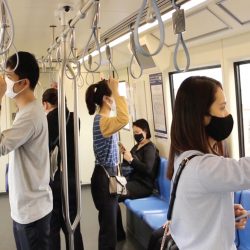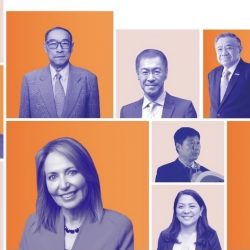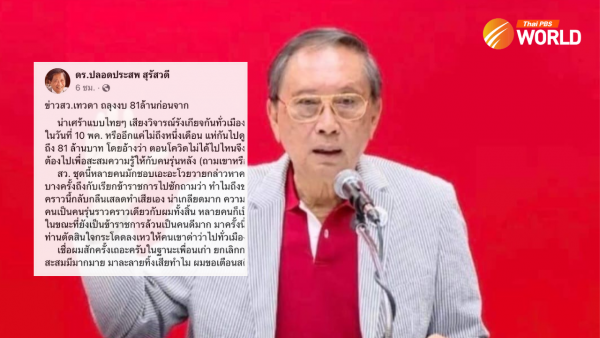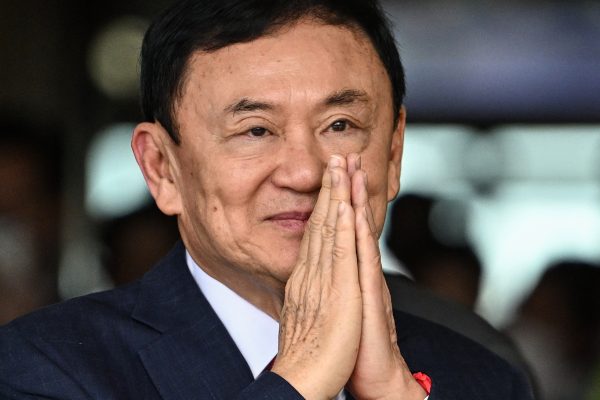Thai Foreign Policy Webinar Series
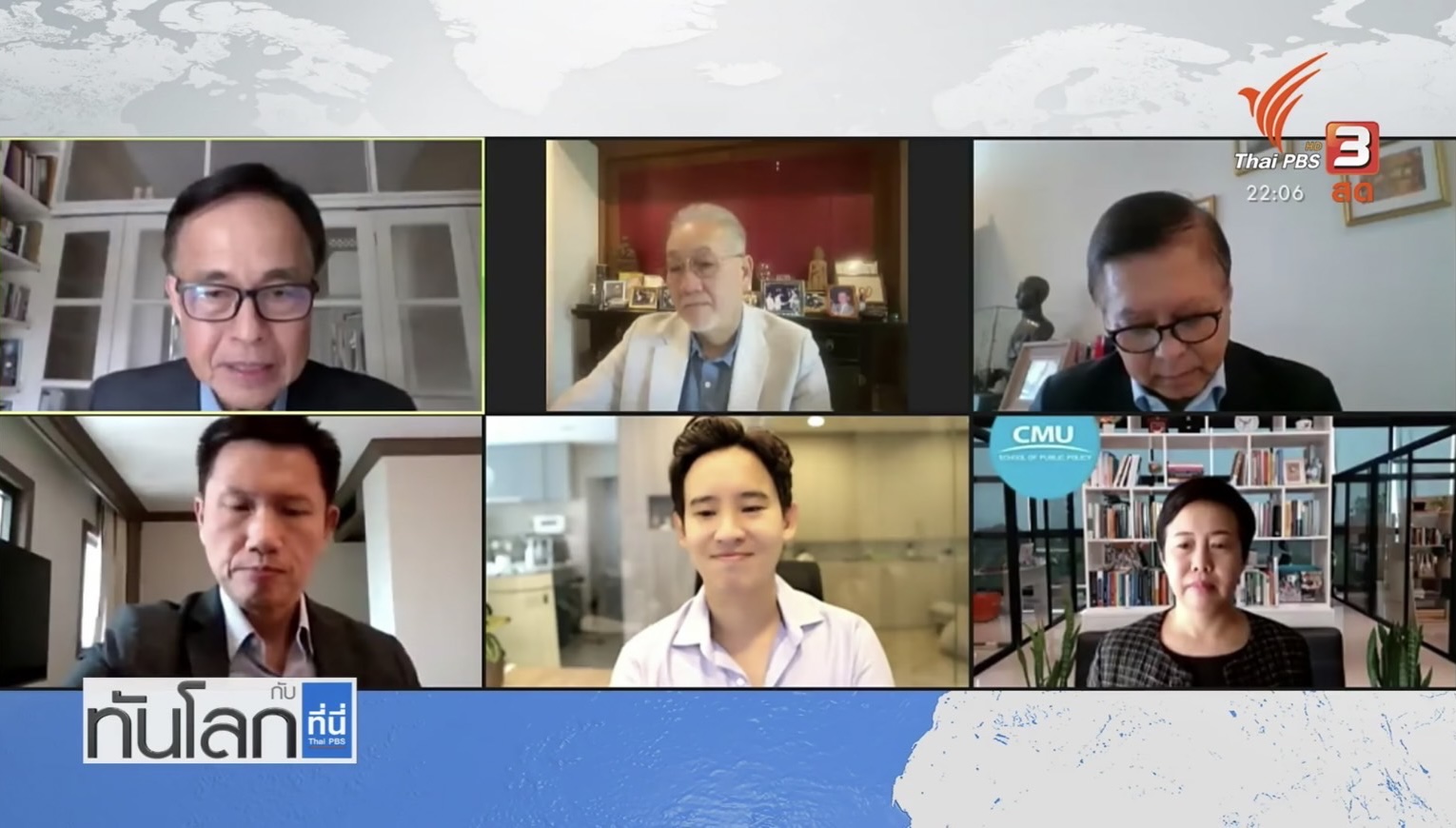
Thailand still has opportunities to rejuvenate its foreign policy and diplomacy, which have fallen to their “lowest point” in living memory, despite the need to play a role amid intense superpower rivalry and geopolitical disorder, a panel of experts said.
Words such as “go with the flow”, “missing in action”, “excessive defensiveness”, “lacking backbone”, “lack of narrative”, “inferiority complex” and “inward looking nationalism” were the way Thailand’s foreign policy was described by webinar panelists.
Myanmar, human rights values, geographical advantages, alongside unique past relations with the superpowers, were cited as among the opportunities for Thailand to seize and re-ignite its foreign policy, said the panelists at a recent webinar “Thai Foreign Policy and Diplomatic Strategy”, moderated by Thepchai Yong of Thai PBS World.
This is the first of a five week series of webinars on Thai foreign policy, co-hosted by the Surin Pitsuwan Foundation, Chiang Mai University’s School of Public Policy, Thai PBS and Asia News Network.
Sihasak Phuangketkeow, former permanent secretary for foreign affairs, said good foreign policy must begin at home with strong domestic politics and a vibrant economy. “My concern is whether we have limited ourselves with neither a position nor a strategy”.
The most pressing challenge, according to him, would be how foreign policy can be mobilised to aid economic recovery after the COVID-19 pandemic. “We have embassies, counsellors and others…we should use these mechanisms. Foreign policy must meet these issues.”
Thitinan Pongsudhirak, professor and director of the Institute of Security and International Studies at Chulalongkorn University’s Faculty of Political Science, said Thailand has diminished in global diplomatic importance. Whatever diplomatic capital the country may have had, it was used to explain why the coup happened and then when the elections would be held.
He also sensed that “we have been evasive because we feel ‘inferior’ and not only because of the ongoing domestic political conflicts, but questions over government legitimacy remain. Such an inferiority complex makes our foreign policy and diplomacy swing out of line.”
Kiat Sittheeamorn, Democrat Party MP and member of the House committee on foreign affairs, said the world has changed “but we haven’t”.
“The House Committee set up a sub-committee and I am chairman. We look at all issues and invite everybody to participate. We found that we don’t have a clear foreign policy strategy and have to redefine what our interests are. The world has changed a lot and we have become unusually silent.”
He added that the geopolitical balance has shifted with China, for example, but Thailand never attempts to gain a deepunderstanding as to what this could mean to the country, the region or what position and strategy should be adopted. “We haven’t done the homework. We have talented people, we have brains, but they don’t sit down and talk with one another.”
“We didn’t ask the right questions, so we got wrong answers,” he lamented.
Pita Limjaroenrat, leader of Thailand’s Move Forward Party, said the Foreign Ministry will reach its 150th anniversary in 2025, but the country’s foreign policy has no backbone at a time of world disorder.
This has meant that the US, Thailand’s oldest ally, bypassed the country when the Biden administration began and Vice President Kamala Harris went to Singapore instead, to talk about AI and cyber security, and to Vietnam to talk about the South China Sea.
“I remember the old saying “Foreign policy which has no positioning will have nowhere to stand in the world,” said Pita.
Ora-Orn Poocharoen, Director of the School of Public Policy at Chiang Mai University, saw the malaise as part of a major trend towards declining nation state and the Thai tradition of centralization.
She said, however, that the pillars of foreign policy should be emancipated and allowed to blossom, such as in business, civil society and scholars with a sense of belonging to the world, if the centralisation can be dismantled and global humanities recognised.
Myanmar
Myanmar is cited as a prime example where Thailand, both as the frontline and its history as bridge builder, can reassert its foreign policy position and align its values with Myanmar people by achieving peace, stability and security.
Kiat was critical of the Thai government’s response to the Myanmar crisis. “We present ourselves as though we have no values with respect to human rights. It’s unacceptable and it’s not about non-interference, as a line has been crossed”.
“I am uncomfortable (presently) because we don’t have a strategy. We look only at immediate interests and issues and we don’t want to think ahead to how peace, stability and progress can be achieved. What we must do is to make more effort as we are frontline state,” Sihasak said.
“We must think like a frontline state and lead, not be led, andlead ASEAN. It is discreet diplomacy. We have channels through the military and to the opposition. Why don’t we use them? It may not be easy, because the Tatmadaw want to hold on to power, but we have to convince and apply pressure.”
“We need to do more and exercise leadership. It’s an opportunity to show that Thailand matters,” he added.
Kiat added that Thailand should gather all countries willing to help and not just criticise or impose sanctions. There are opportunities to work with Russia and China and the later has already given positive signs.
Pita called for Thailand to take a lead in establishing a “humanitarian corridor” which does not involve military of either country.
Thitinan said ASEAN faces grave unity challenges on the Myanmar crisis. Some members have condemned the coup,while some are reluctant. Thailand is trying to evade the issue, with the government having little to say about how the Myanmar coup was wrong.
He suggested that even the Thai and Myanmar armies could do something and find a way to make Myanmar domestic politics acceptable to the international community. “Such diplomacy we can do, but we are caught in our own trap. Domestically we don’t want people to know us, or others to get involved with us because of the weaknesses we evade, hiding and letting the problems pass, but they don’t.”
Ora-orn suggested that, apart from basic necessities to support the growing number of displace persons in Myanmar , Thailand must help scholars, academics, researchers, civil societies andstudents who have lost their places to continue their work and their capacity building in the medium term.
Opportunities
Thitinan suggested that Thai foreign policy has sunk to its lowest point, through a mixture of a hybrid military regime and widening bureaucratic rule, under which everything is administered in the name or excuse of “security”.
He called on the military people turned politicians to decouple their political roles and allow professionals to run the country, as in past coups. In foreign policy, Thailand still has the advantage of its geography, critical mass and balanced and agile relations with the superpowers.
Pita said Thailand has opportunities to reassert its foreign policy and diplomacy with the upcoming chairs of Bimstec, APEC and ASEAN.
“If we have the narrative, backbone, strategy political leadershipand know our values and interests, we could use all three occasions to re-emerge.”
He outlined offensive diplomacy in terms of “blue, white green and white” where Thailand can engage and take leadership in maritime, environment and health, respectively. “We can re-engage, we have opportunities and capability.”
Wish lists
Pita said that, if Thailand can grow a foreign policy backbone, regarding both values and interests, there will be a narrative which the country can use to develop a true presence in the global arena.
“So far, however, the country is “missing in action”, we lost balance and many allies, like the US, and became entangled in unbalanced relationships with some of our neighbours, such as China. How can we pivot back to the US and EU, to upgrade our human rights standards and engage with blue, green and white diplomacy in the 3 upcoming big events?” he asked.
Ora-orn said nationalism and national interests are merging intoglobal interests. Thais must be part of the planetary benefits and,“if we are too parochial we will not be seen as either authentic or sincere by our partners.”
Thitinan said the Thai political class needs to correct and reconcile the past two decades of domestic conflict and move into a new phase. This would entail re-engaging with the superpowers by using diplomatic capital to balance and uplift the bargaining power.
“Beyond that, our strategy should be to become a “middle superpower”, but one which is reconciled with a position and with our people having the power to set their own destiny, not from the top down.”
Sihasak said, while Thai diplomacy has gone off the radar, “as diplomats we are optimistic, but we have to get away from present mindset, which limits us, and have positions. Values are important and are something which can aide in international relations. If we are realistic and position ourselves well, we can make a return”.
Kiat summed up by saying that Thais should be key players and stakeholders in international diplomacy. “We should be global, in tune, modern. By the people and for the people.”
EP.2 on COVID-19, health and vaccine diplomacy takes place on Thursday, Oct 28th at 10.30am. Webinar registration at www.thaipbs.or.th/Register

